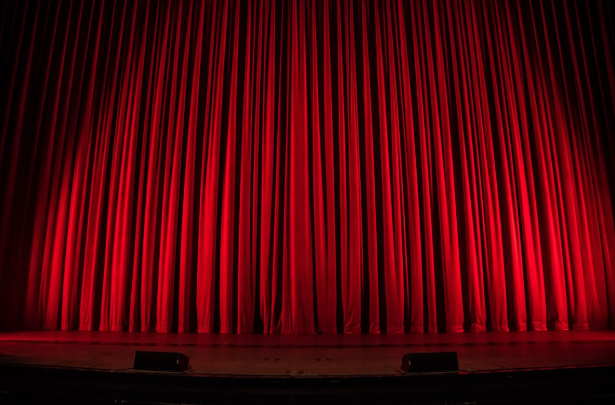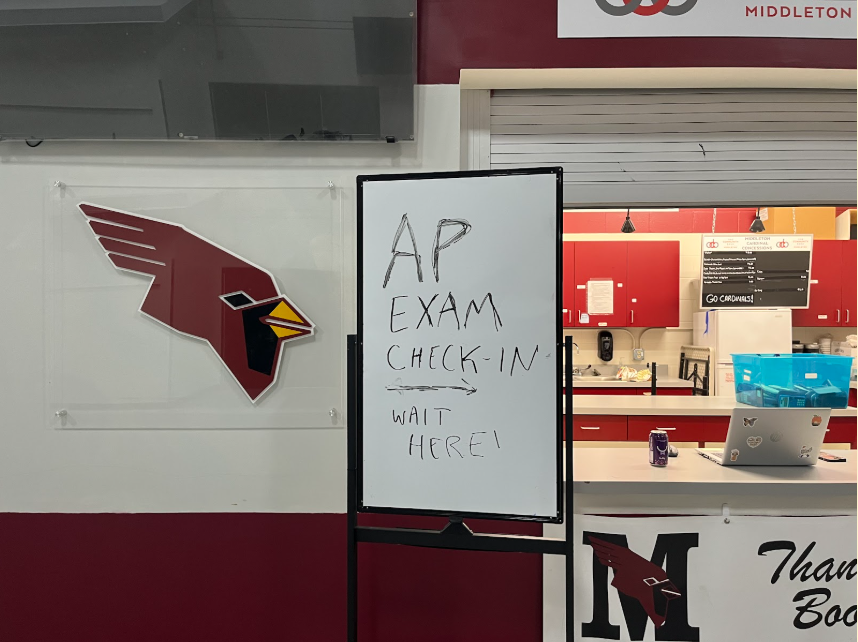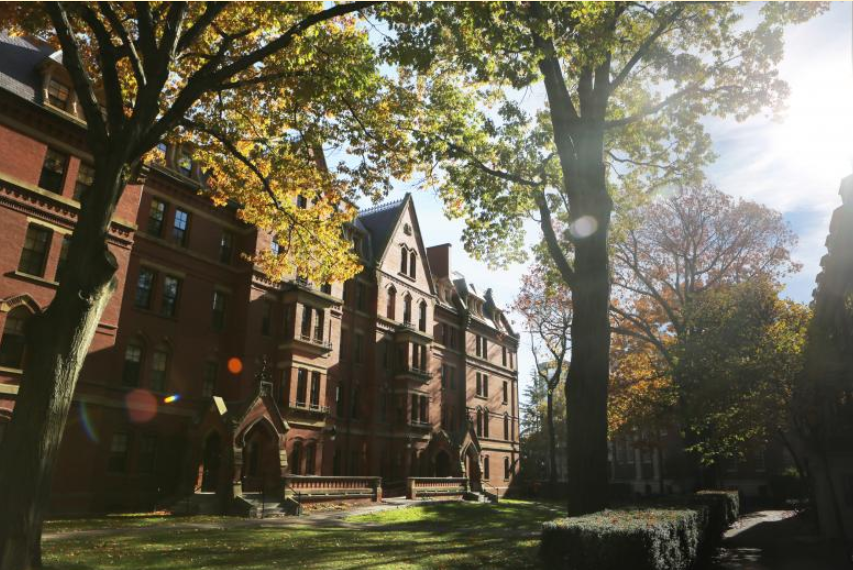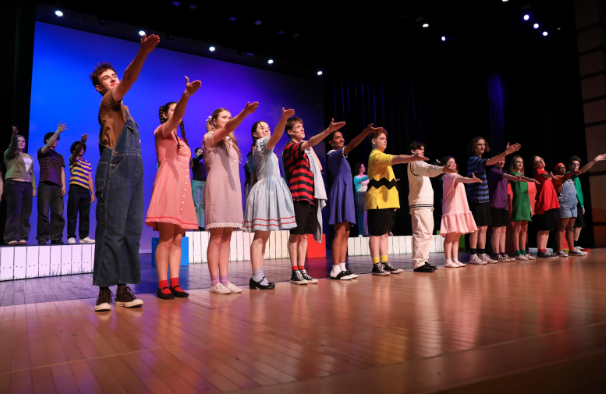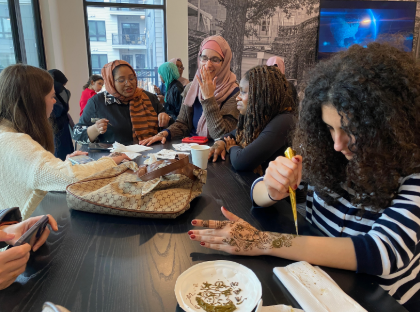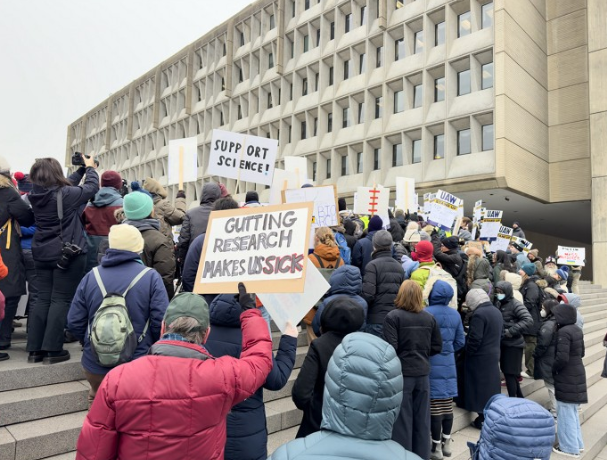A pianist gracefully sits on the bench, arching her fingers which wait patiently to glide over the white and black keys to share the piece’s complex and beautiful melodies to the judges. However, as she starts to play and the momentum of the music builds, she notices something. The piano is slowly rolling away from her. This is just one of the unexpected (and a little scary!) but lighthearted moments that occurred during the Middleton High School (MHS) 2025 Concerto-Aria Competition.
During the evening hours on Tuesday, Jan. 14th, 2025, 20 talented MHS musicians gathered to audition for the competition. The selected winners would have the honor to perform as soloists with the MHS Symphony Orchestra and members of the MHS Chamber Winds ensemble at the Mike Dewey Concerto Showcase, held on Feb. 27, 2025 at 7:30 p.m. in the MHS Performing Arts Center (PAC).
Sitting behind desks in the PAC and the choir room with pencils in hand were the four judges: Kris Saebo, a local bass instructor; Scott Eckel ,a retired band and piano teacher; Patty Schlafer, a retired band teacher, retired; and Kay Black, an orchestra teacher.
Though this was a competition, it was also an opportunity for MHS students to play wonderful music and for members of the community to hear it. Opportunities like these open doors not just for connection and expression, but also healing. For a student, performing their aria that evening may have mended the embarrassment, hurt or anxiety that life threw at them earlier in the day. For a judge, witnessing a student perfect that one run in their concerto that many, including the judge themself, had failed multiple times may have soothed them and given them hope for the future of music. And for a parent, hearing their child complain about practicing since they were young but witnessing them ending their concerto with a big flourish of their bow and a smile may have justified all of the moments the parent had pushed them to practice. Music has the ability to mend the self, members of the audience and communities.
Without further delay, it’s a great pleasure to introduce the 2025 MHS Concerto-Aria Winners and Honorable Mentions!
Eunice Chung
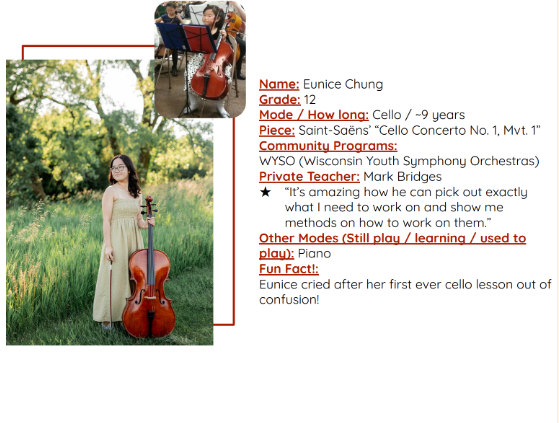
Photo (right) by Jeunghee Chung. (Eunice Chung)
Isa Killian
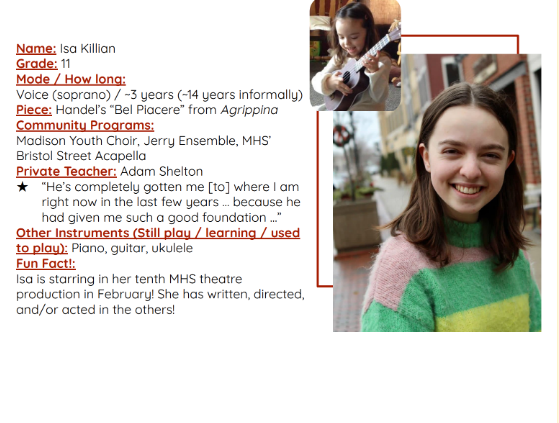
Photo (right) by Hugh Sterling. (Eunice Chung)
Q&A:
Eunice: How were you feeling before the audition performance?
Isa: I felt a little bit nervous, but I definitely went into it with a lot of confidence compared to other auditions. Because first of all, I kind of figured that whatever happens, it’s all right [because] this is a song I know really well. And, I’ve never auditioned for the Concerto-Aria competition before, so I wasn’t entirely sure what to expect. I think that kind of alleviated some of the stress, because I was like, whatever happens, it’s okay. There’ll be other opportunities.
E: How were you feeling after the audition performance, but before you knew the result?
I: I kept the same mindset. I felt that it went pretty well. But I have so much respect for the musicians at our school that I honestly was not expecting to win because I watched some other auditions, and I was like, “wow, this is incredible”. I left feeling pretty good but just curious to find out what happened.
E: According to Mr. Kurr, it’s been four years since an aria has won. Why do you think that is or do you have any thoughts after knowing that?
I: I think they’ve definitely done a better job advertising it [this year] because Ms. Pitt talked about it in choir class to us, and it was just generally more noticeable to me. I also think that [the majority of the competitors audition with] instruments, so singers don’t even realize that they can do it. So I’m hoping that after they see me perform, more singers will audition next year because we have a lot of really good singers in choir.
E: How are you feeling about playing with the orchestra?
I: I’ve never performed with an orchestra before. [I’ve played] with a pit orchestra, but it’s still a little bit different. I’m really excited to try something new and it’ll be a really fun experience! And honestly, that was what I was most looking forward to, the potential of just getting the opportunity to try something new and fun. And, I get to perform with some of my friends who play in the ensemble!
E: Do you have any shoutouts to specific people you want to thank?
I: Shout out to my voice teacher because he’s helped me a ton the last few years. And, always, a shout out to Ms. Pitt because she’s an amazing teacher at our school. And if you’re interested in singing, no matter how much or little experience you have, if you have the time to join choir, go talk to her because she would be thrilled to talk with you and try to help you out. And I just love how welcoming she always is to everyone. I also want to shout out Mike Ross, the director of Madison Youth Choirs, because he’s an incredible teacher, really funny, and everyone there loves him. We work on things very, very slowly and meticulously there. So, the improvement isn’t too noticeable from week to week, but after a few years, I’m realizing how much he’s helped me.
E: What piece of advice would you give to future competitors?
I: It’s great to be really excited about a certain competition or a certain event where you’re evaluated or maybe chosen as a winner, but just remember that although our judges are very educated and honorable, it’s always a little bit subjective. So, don’t be put down if you happen to get someone who didn’t prefer your style of playing, or if you did something unique and your judge didn’t like it as much as you thought they would. They’re still humans too, even though they’re very experienced and knowledgeable people. Just remember [to] keep doing what you want to do and what you enjoy doing, and keep working hard and different opportunities will come. Sometimes, there’s always a little bit of luck. Sometimes the judges just like you and they get a good vibe from you. So, just keep that in mind and don’t take anything too much to heart whether you win or you lose. Don’t let it get in your head either way!
E: How do you feel when you play music?
I: I always really enjoy it. I really like singing because it just doesn’t matter where you are. You can do it anywhere as long as you aren’t disrupting people in the middle of the street. I like that it’s something so innate in everyone, and you really don’t have to be a “singer” and/or you don’t have to be “good”. Sometimes we’ll fall into too much judgment or stigma at being talented at things. The same kind of [concept] applies to other forms of creativity, like drawing or dancing. But, I think singing is one of those things that’s instinctive. As long as you enjoy it, you can just do it. Even though I’ve worked hard on technique, development, and growth, it’s just really fun. Even if I don’t sound amazing all the time, I just really enjoy doing it.
E: When you were having a bad day or going through challenging experiences, what was music’s role in your life?
I: I’m not one of those people who will listen to music to feel better when they’re upset, but it definitely does make me feel better to practice singing or to see how much I’ve improved. If I ever come across a recording of myself from a few years back or experience a voice lesson that shows growth, it always makes me really happy and brightens my day. I can tell that my work has paid off, and that makes me really happy.
E: Do you think music has the ability to heal?
I: I’m not sure if there’s been research done on that on a more physical or observable level, but you’ll hear from many people, whether or not they’re a performer, just how much listening to music has helped them feel better or improve their mental state in any kind of situation. People hold so much weight on music, and whether it’s obsessing over your favorite artist or listening to sad songs when you’re in a certain mood, you don’t have to be a performer to appreciate how impactful it is.
E: Do you think music has the ability to bring hostile individuals together and mend connections between people?
I: I don’t think music has that power on its own, but I think it has a vulnerability to it. I think if we take a lesson from music and treat each other with that same kind of open mindedness and willingness to listen to other people the way we listen to music, we can have more productive discussions in our world. So although music isn’t a solution to everything, I think with the creativity and expression [music teaches], we can become wiser.
E: What do you think your role is as a member of the MHS musical community and in a broader sense as well?
I: [In the theatre program,] I am not only a member and a performer but also a helper and a mentor. At least, I would like to consider myself that way. Also through choir, I’ve become close friends with a lot of students who are one or two grades younger than me, and I’ve spent a lot of time helping them with auditions or giving them advice for songs. Some of them send me videos out of the blue for feedback. It’s meaningful to see that they see me not just as someone who can sing, but someone who can help them, because I think that means more to me.
Harry Jin
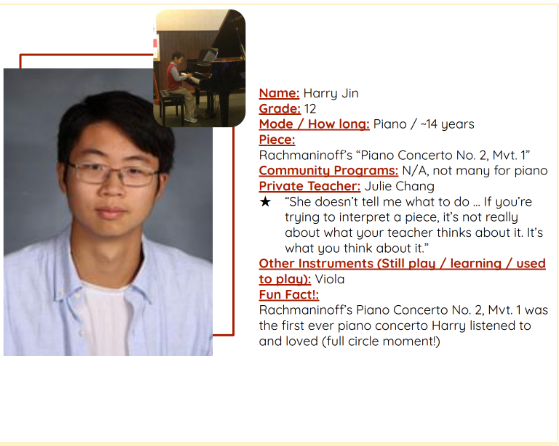
Photo (right) by Song Jin.
Q&A:
Eunice: How were you feeling during the performance?
Harry: I was stressed at first. The piano was rolling away and there wasn’t a second piano for accompanists, so he was just playing on a keyboard. And I couldn’t hear anything. It was just very strange this time. This one was kind of chaotic. So, I was just confused.
E: How were you feeling and how did you react when you found out you were one of the winners?
H: [I felt] pretty good. [When I saw the result,] I was like “huh”. I don’t have that many emotions. I was glad I won, but I don’t react much. [However,] I was excited. I was excited to play with the orchestra!
E: This is your second time competing in this competition. How did your performance experiences differ?
H: Last year’s concerto was my first concerto, so I just wasn’t experienced. I just didn’t get the piece last year. [Then, I was] just trying to play it, but this year, I think I got the piece.
E: Do you have any shoutouts to specific people you want to thank?
H: [I want to give a shout out to] my accompanist, Jay Chen, as well as my teacher, Julie Chang. [I also want to thank] everyone else who competed because ultimately, it’s not about the competition. It’s fun to figure out a piece even if you don’t win! [Also,] shout out to Selina [Wen] because we practiced a lot together. [Those practice sessions] were fun and goofy moments with friends.
E: What piece of advice would you give to future competitors?
H: I don’t know if this works for other people, but if you’re really stressed while you’re playing, you can think about random stuff and you’ll stop being stressed. [For example,] during this [audition] performance, I started getting stressed and shaky. [However,] I can play through [the piece] with muscle memory. If you start overthinking, you screw up, right? So, I started thinking about organic chemistry. That’s a great way to take your brain off being stressed. It works. I swear it works. I’ll probably have to do that again while I perform with the orchestra too!
E: Why is music important to you?
H: It’s something that’s different because, otherwise I would study all day. It is a break, an activity, [from all of the school-related things]. Also, [the] connection with others [that music brings me] is good.
E: Do you think music has the ability to bring hostile individuals together and mend connections between people?
H: I think that if you don’t have nice things, it’s easier to get angry [at each other]. And music’s a nice thing, right?
E: What do you think your role is as a member of the MHS musical community and in a broader sense as well?
H: I have a hard time sometimes because it feels like I didn’t do anything [for the MHS musical community]. But, also I’m contributing in a way by just being there [and competing]. Broadly, [I’m] learning from a teacher and [that even is] contributing to the music[al community]. Additionally, playing with others is another good thing for the community, [and through that,] if you learn from other musicians, all [of the collective musical knowledge] builds and expands.
Honorable Mentions (alphabetically): Linus Ballard (12-tenor), Sarah Blust (11-piano), Kyle McIntosh (11-cello), Indre Raghavan (11-violin), Karl Schaefer (12-tuba), Ryan Slattery (12-alto saxophone)
Music has an amazing ability to mend mental, emotional and interpersonal distress. Through listening to their favorite artist, playing through a solo piece that you love, singing your heart out and millions of other different ways to enjoy music, a person’s soul heals. In the poem The Man with the Saxophone by Ai, playing music is described as a savior, an outlet that gives its creator repose in the often harsh world: “each note a black flower, opening, mercifully opening into the unforgiving new day.”
So, the next time — possibly the Feb. 27 performance! — you hear music, think about it as a band-aid, a method of healing whatever negative thoughts and emotions are churning inside you. The cello’s tune is stitching up all your thoughts of self-doubt and blame, the sonorous voice is tending to the destructive fight with your friends and the heart wrenching piano melody is, believe it or not, mending your overworked heart back together.



